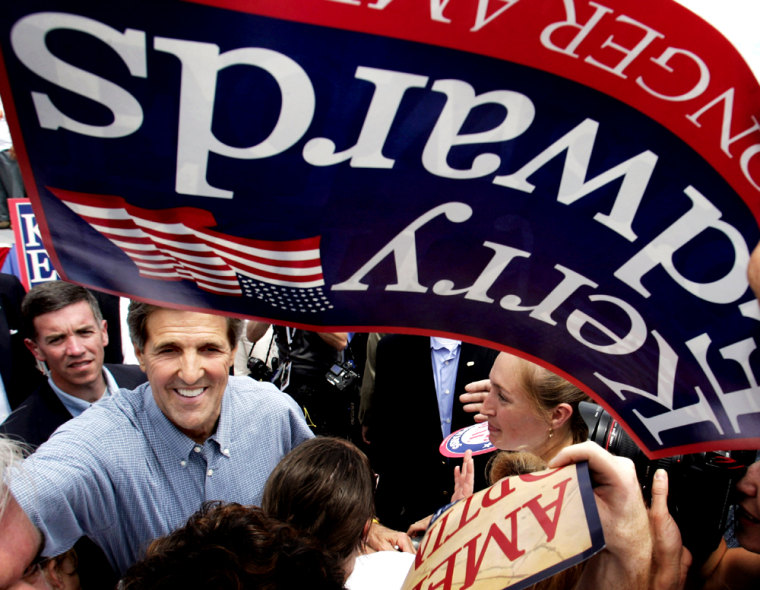If John Kerry’s team executes its meticulously planned staging over the next four days at the Democratic National Convention here at Boston's FleetCenter, Americans will see an eloquent and heroic figure on their television and computer screens.
If, during the last 18 months of campaigning, you missed the fact that Kerry served in combat in Vietnam, count on hearing and seeing it this week. Constant repetition often does win elections.
While most Americans who will end up voting Nov. 2 already know that Kerry served as a “swift boat” commander in Vietnam, on the eve of the convention there is uncertainty about how Kerry will offer himself to his national audience Thursday night as a war-time commander-in-chief.
Will the combat veteran summon Americans to renewed combat with Islamic terrorists?
Will he help listeners make the transition from seeing Kerry as Navy skipper on the Mekong River to envisioning him as a resolute commander-in-chief? As the prerequisite to that, can he prove he is an inspiring war-time speaker?
Rhetorical style
Part of the answer to the latter question is in the mechanisms of Kerry the orator: his pace, cadence and timbre.
During last fall’s primary campaign, Kerry’s extemporaneous speaking became turbid when he wandered off from a voter’s question into a digression. Since he’ll be reading from a text Thursday night, rhetorical drift should not be a problem.
Last October, explaining his vote against Bush’s request for $87 billion in funds for operations in Iraq and Afghanistan, Kerry said, “We need a detailed plan, including fixed timetables and costs, for establishing civil, economic and political security in Iraq.”
But on Thursday night in Boston, Kerry is not likely to offer details, fixed timetables or costs. If he were president, he told the Wall Street Journal on July 15, he would wait until there is stability in Iraq before withdrawing US troops.
"I will provide for the world's need not to have a failed state in Iraq," he said.
If not a plan for disengagement from Iraq, will Kerry sketch a plan to shift the focus of U.S. military efforts from Iraq back to al-Qaida and other Islamic terrorist groups?
Defining the enemy
Kerry’s former rival for the Democratic nomination, Sen. Joe Lieberman, D-Conn., last week urged Americans to re-sharpen their focus on just who the enemy is: “We fear that many Americans may not fully understand the long-term goals of the enemy we face: those are deadly totalitarian goals…. Jihadist terrorism is a totalitarian ideology as threatening to freedom as fascism and Communism were in the last century.”
The risk if Kerry makes the war against terrorists the main focus of his speech? Fighting a war displaces other issues on which Democratic candidates have for 40 years lavished their attention: the environment, renewable energy, more spending on public education, abortion rights, gun control, etc.
Look to Kerry’s speech Thursday night to see how prominently he places two issues on which many of his fellow Democratic liberals in the Senate place high priority: the death penalty and legislation to renew the ban on so-called “assault style” weapons set to expire on Sept. 13.
Some Democrats are so skeptical of the manner in which the death penalty is meted out that they want it abolished or at least suspended.
Although Kerry voted repeatedly against the death penalty earlier in his Senate career, in 1996 he voted for a bill expanding the federal death penalty to include certain terrorist acts.
Along with Democratic baseline issues, another yardstick against which to measure Kerry’s speech will be that of Al Gore at the Democratic convention four years ago.
Gore's speech, partly the handiwork of consultant Bob Shrum, who now advises Kerry, epitomized neo-populism, with denunciations of “big tobacco, big oil, the big polluters, the pharmaceutical companies.”
Shrum's neo-populism
Gore told his audience, “So often, powerful forces and powerful interests stand in your way, and the odds seemed stacked against you — even as you do what's right for you and your family…. That's the difference in this election. They're for the powerful, and we're for the people.”
In retrospect, centrist Democrats such as Al From of the Democratic Leadership Council thought the Gore-Shrum populist approach misguided at a time of unparalleled prosperity and high employment. It “evoked the specter of class warfare,” From said in the wake of Gore’s defeat.
Of course, no acceptance speech is purely about one topic — Kerry will at least touch on public education and abortion, for instance — and yet, once the speech is over, pundits and Kerry’s fellow politicians will focus on one core idea or memorable phrase.
If Kerry chooses to forego populism and emphasize national security, if he makes his speech accepting the nomination into his bid for acceptance as a war-time leader, Kerry could learn from the last Democratic presidential candidate to run and win in war time.
Accepting the Democratic nomination on July 19, 1940, Franklin Roosevelt summed up the crisis Americans faced in such stark terms that no listener could doubt his determination.
“In times like these — in times of great tension, of great crisis — the compass of the world narrows to a single fact,” he told the convention in a radio broadcast. “The fact which dominates our world is the fact of armed aggression, the fact of successful armed aggression, aimed at the form of government, the kind of society that we in the United States have chosen and established for ourselves. It is a fact which no one longer doubts, which no one is longer able to ignore.”
“The compass of the world narrows to a single fact.” This week’s speech from Kerry will disclose whether he thinks the compass has narrowed Americans’ concerns down to defending the nation against terrorists, or whether he sees the compass as wide enough to include education, the death penalty, abortion, the environment and other traditional Democratic themes.
